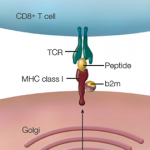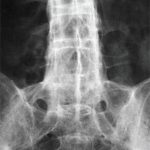NEW YORK (Reuters Health)—Secukinumab appears to improve clinical and radiographic outcomes of ankylosing spondylitis (AS) through two years of therapy, according to new results from the MEASURE 1 study. Secukinumab is a fully human monoclonal antibody against interleukin-17A, which is implicated in various pathophysiological features of spondyloarthritis. In a report online Dec. 13 in the…

Rheumatology Drug Updates: Abaloparatide Promising for Osteoporosis, Plus Secukinumab for Ankylosing Spondylitis
Abaloparatide for Osteoporosis Abaloparatide is completing Phase III clinical trials for the potential treatment of postmenopausal osteoporosis in women who are at an increased risk of fracture.1 Abaloparatide is a synthetic peptide that engages the parathyroid hormone receptor and has favorable bone building activity. Abaloparatide has completed Phase 3 development for use as a daily…

Abaloparatide Promising for Osteoporosis; NICE Draft Guidelines Include Secukinumab for Ankylosing Spondylitis
In a clinical trial, subcutaneous abaloparatide has proved effective in treating postmenopausal women with osteoporosis. Also in the U.K., draft guidelines for treating ankylosing spondylitis will recommend the use of secukinumab…

Sexual Dimorphism Found in Immunologic Profiles of Patients with Ankylosing Spondylosis
A study that found distinct sexual dimorphism in the immunologic profiles of patients with ankylosing spondylosis (AS) suggests that sex is an important variable to address in future research and may eventually lead to more effective sex-specific therapy for patients with the disease. The research, published in the March 2016 issue of Arthritis & Rheumatology,…

How HLA-B27 Research Landmarks, Advances Relate to Ankylosing Spondylitis Pathogenesis
The mechanistic link between human leukocyte antigen B27 (HLA-B27) and ankylosing spondylitis (AS) is one of the great enigmas in rheumatology. The introduction of biological therapies that target tumor necrosis factor (TNF) or the interleukin (IL) 23/IL-17A axis has had a major impact on the quality of life for many patients with AS, and one…

Conformational Flexibility in HLA-B27 Provides Clues to Development of Ankylosing Spondylitis
Understanding how human leukocyte antigen (HLA) class I molecule B27 promotes spondyloarthritis has intrigued researchers for four decades. Although the association between the single gene variant HLA-B27—specifically some of its subtypes—with ankylosing spondylitis (AS) is particularly strong, how HLA-B27 directly influences disease development has not yet been clearly explained, although hypotheses continue to be generated….

From the Expert: Dr. Michael Weisman Discusses the Challenges of Enthesitis
A recent review in Arthritis & Rheumatology examined advances in addressing the pathophysiology, genetics and treatment of enthesitis for patients with spondyloarthritis. And author Michael Weisman, MD, notes that challenges remain in understanding the genetics and triggers of enthesitis…

New Guideline: NSAIDs Effective in Treating Ankylosing Spondylitis & Nonradiographic Axial Spondyloarthritis
In February, new recommendations were released for the treatment of ankylosing spondylitis and nonradiographic axial spondyloarthritis, noting that NSAIDs may be the best initial treatment for the diseases, with TNF inhibitors as second-line therapies. The guideline was the result of a joint effort by the ACR, the Spondylitis Association of America and the Spondyloarthritis Research and Treatment Network…

Clinical Trials Confirm Secukinumab Can Effectively Treat Ankylosing Spondylitis
Secukinumab, an anti-interleukin-17A monoclonal antibody, has successfully completed multiple clinical trials, which found the intravenous treatment may be safe and effective for treating patients with active ankylosing spondylitis…
FDA Advisory Panel Strongly Backs Biosimilar Form of Remicade
(Reuters)—A medical advisory panel to the U.S. Food and Drug Administration on Tuesday recommended approval of a cheaper biosimilar form of Johnson & Johnson’s arthritis drug Remicade (infliximab) that could eventually batter sales of the branded product. The panel, by a vote of 21-3, supported use of the biosimilar from Celltrion Inc. and Pfizer Inc.,…
- « Previous Page
- 1
- …
- 3
- 4
- 5
- 6
- 7
- …
- 11
- Next Page »